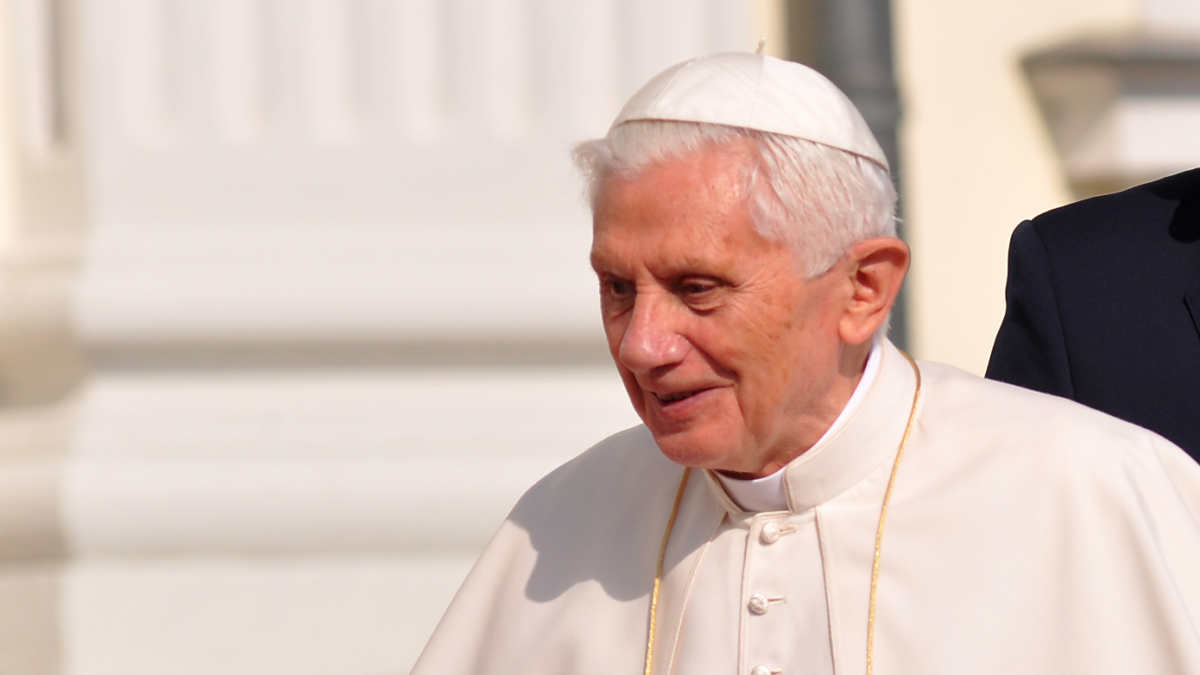When our first son was born in 2020, my wife and I named him Benedict, in part after the witness of the tremendous Pope Emeritus Benedict XVI, who died Saturday morning in Rome at age 95. Benedict will forever be remembered for his deep faith and capacity to transmit church teachings with cogency and depth, but what stands out perhaps more than anything else from his writings, speeches, and life is the stress he placed on two realities concerned with being a Christian: encounter and truth.
In his encyclical (formal letter written by a pope) called Deus Caritas Est (“God is Love,” in English), Benedict noted, “Being Christian is not the result of an ethical choice or lofty idea, but the encounter with an event, a person, which gives life a new horizon and a decisive direction.” As a learned theologian and a man of intense prayer, Benedict knew that people needed to hear this message: Being Christian is about a relationship with a person who actually lived and is alive today.
So many confuse the church’s mission and reason for existence. The church does not exist to bore its worshippers on Sundays, take their money, and give them orders on how to live their lives. The church exists as the concrete reality by which people today can experience Jesus as God and as having risen from the dead. Encounter-focused faith was a major mark of the pope’s ministry because without this being conveyed, Christianity, and the rest of the world, would disintegrate.
This is what our world needs to hear more than anything else. We are made for relationships, we need one another, and if the No. 1 relationship in our life (the one with God) is not alive, everything else crumbles. As noted in a recent article in The Federalist entitled “If Your Kids Are Unhappy, Take Them To Church,” Mary Rose Kulczak shows that attending worship leads to higher grades and a healthier sense of self-worth.
Sherry Weddell, author of a groundbreaking work in the Catholic Church entitled “Forming Intentional Disciples,” cites data that notes that a person’s belief in a personal God with whom they can have a relationship is directly correlated to whether they attend church on Sundays. It is all about encounter. If we know we are truly seen and loved by God and that we are truly seen and loved by others, the human spirit lives life to the fullest and feels fulfilled. Benedict XVI knew this in his bones, and he craved to transmit this truth to the world.
The former pope also constantly spoke about the need to clarify the truth and fight against what he called the dictatorship of relativism. The definition of truth is the correct correlation between one’s mind and reality. Relativism is the doctrine that knowledge, truth, and morality exist in relation to culture, society, or historical context and are not absolute. Benedict consistently noted that this is the root of all of the issues of modern culture and society.
In his book “Christianity and the Crisis of Cultures,” he says: “it is the expression of a consciousness that would like to see God eradicated once and for all from the public life of humanity. … [I]n this way, relativism … becomes a dogmatism that believes itself in possession of the definitive knowledge of human reason.”
Relativism claims there is no absolute truth, but in doing so, it makes a claim for something absolute — that there is no truth. In doing so, relativism is defeated by its own definition. Benedict knew the illegitimacy of this false logic, but he also knew its dangers. If there is no God, then reason itself is erroneous. If there is no truth, then truth is determined by the powerful rather than discovered by the mind. That logic has placed our country in a lot of trouble. We need to rely on truth like Benedict did, even when it puts us at odds with what people feel and even when it makes us sound intolerant.
Truth exists outside of one’s feelings because the evidence is meant to be examined objectively. The former pope always desired to ponder the church’s teachings on morality through the lens of objectivity because that is why God gave us reason — He wants us to use it.
Without a spotlight on encounter and truth, the church will continue to decrease in its vitality and effects, and the culture will also become more and more corrupt with godless and lifeless philosophies. Benedict knew this, and he tried his best to showcase it. He held to his faith in a serious fashion because he held it to be true. Not because he was a bigot, but simply because he knew Jesus as a real person, and he knew Christianity is different from any other religion because it is based on real events that people saw with their eyes and touched with their hands.
When we allow ourselves to be receptive to who God actually is and what He said and did, we can experience the truth in a way that transforms us from the inside out. America today could use a good dose of encounter and truth. May the witness of Benedict provide part of the recipe for us to do so in this new year ahead.









